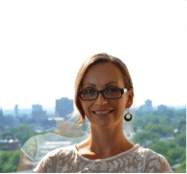Subscribe to our newsletter
Who Was Your Female Role Model? Well… That Depends #MySTEMrolemodel
 My name is Christine, and I am an immunologist. I am currently working as a research specialist at the Ragon Institute of MGH, MIT and Harvard in Cambridge, Massachusetts. After my undergraduate studies in Oxford, I moved to London for my PhD and first postdoc. After 7 years in this magnificent city, I was ready for an adventure and decided to go to Boston for a second postdoc. Six years later, I’ve made Boston my permanent home, but am about to embark on a 6-month sabbatical back in London, where I’ll be learning new things at The London School of Hygiene and Tropical Medicine before returning to Boston. In addition to doing research, I write a series of blogs for Digital Science about life as a scientist called CoffeeTime Science.
My name is Christine, and I am an immunologist. I am currently working as a research specialist at the Ragon Institute of MGH, MIT and Harvard in Cambridge, Massachusetts. After my undergraduate studies in Oxford, I moved to London for my PhD and first postdoc. After 7 years in this magnificent city, I was ready for an adventure and decided to go to Boston for a second postdoc. Six years later, I’ve made Boston my permanent home, but am about to embark on a 6-month sabbatical back in London, where I’ll be learning new things at The London School of Hygiene and Tropical Medicine before returning to Boston. In addition to doing research, I write a series of blogs for Digital Science about life as a scientist called CoffeeTime Science.
Who was your female role model? Well… that depends.
I am a woman. I am a scientist. Both of these things define a large part of who I am. A lot of people have been talking about women – or more precisely – sexism in science recently (see recent stories on bias in reviews and the infamous Tim Hunt), and it is easy to assume that such high-profile incidents are the main impetuses for myself and others to talk about this topic. The truth is, I – and most female scientists I know – think and talk about what it means to be a woman in science often. Some of my female colleagues and I went to a symposium on Women in Biotech at the Radcliffe Institute for Advanced Study the other day. The symposium was fantastic, and the speakers provided some excellent talks, presenting their research, sharing their experiences and providing more than enough food for thought. I’ll probably write in more detail about it in my blog, but what I want to talk about here are some memories that were triggered at that event.
The Radcliffe Institute stems from Radcliffe College, an all-female counterpart to an all-male Harvard College at the time, with Radcliffe College becoming the Radcliffe Institute for Advanced Study at the completion of its merger with Harvard in 1999. In keeping with Radcliffe’s historical and ongoing commitment to women, the symposium was organized by women and for women, lead by women, and the panels of speakers comprised entirely of women. Sitting in this old building with squeaky wooden floors surrounded by smart, strong women engaged in lively discussion reminded me of another all-female institution that shaped my life as a young woman: St Hilda’s College, Oxford. At the time, my college was the last all-female college at Oxford University, and in the three years I spent there I was surrounded by smart, strong, and ambitious women, and gender issues, sexuality, equality and feminism where discussed as frequently and vehemently as beer prices at the bar, boys, exams, tutorials and East Enders. I loved being at St Hilda’s, I loved that it was all female. Most of the men who frequented there loved it, too.
Thinking back, I didn’t really have any female role models growing up – historical figures like Marie Curie were interesting, and obviously important for the role women are perceived to have in society, but I never related to them, they were just that; historical figures. To be honest, my main role model growing up was male and the centre of my world: my father. He installed a strong sense of equality in me, and raised me to believe that I could do whatever I set my mind to and that I need never be dependent on a man, or do what a man tells me to do, for that matter (much to the annoyance of my older brother at the time – although he is the same now with his children). My father set me on the right path and instilled me with confidence. The women at St Hilda’s (and I am referring almost exclusively to my peers, many of whom are still close friends today) made me realize the importance of female support networks, and the fact that women’s issues were a thing that needed to be talked about in the first place. Several years later, I had my first experience of open sexism directed against me, and it was this all female network of friends from St Hilda’s that helped me process what was going on, and to find the strength to take action and get myself out of a very toxic situation.
So in a way, my role models in my 20’s were my female friends: scientists, musicians, solicitors, doctors, teachers, writers, programmers, social scientists… the list goes on.
Fast forward to the present. I am trying to think who my female role models are. I realise that I don’t have any particular female (or male) role models right now. I think about women I have worked with and look up to, and while I greatly admire them and value them as my mentors, they aren’t my role models. That gets me thinking about that word. Who can be a role model? For some reason, I keep thinking about persons in positions of leadership or authority – by definition, a role model should be someone who inspires you, who you aspire to emulate, right? But does that mean they have to be in high-up positions?
Maybe a role model can just be someone who you think is awesome, and who makes you believe in yourself?
Several years ago, I was visiting family friends on their farm in rural Germany. One of the daughters (aged ten or so), had been out riding her horse with a friend, and we greeted them in the yard as they returned. I got introduced as ‘Christine, who is a scientist living in the US’. Both girls exclaimed “Cool!” in unison. I remember feeling surprised – and humbled. What if this was the first time they got introduced to the concept of a female scientist, someone who has lived in different countries, and as a consequence, these girls now start imagining themselves as scientists travelling the world sometime in their future? Wouldn’t that be amazing? I think about my position now and over the past couple of years. I have had several young women under my supervision, and I have always tried to encourage and support them. From writing reference letters to taking them out for a coffee on a bad day in the lab, I have tried to be the kind of supervisor/mentor they needed me to be. But am I a role model? I don’t know. I know for sure that having a positive impact on a young woman is something incredibly rewarding and worth working towards.
Who can be a role model? Anyone, I guess. That’s the beauty of it!



